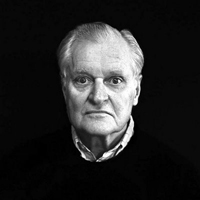John Ashbery - Biography and Works
John Ashbery is an American poet who came to prominence in the sixties and seventies in the United States. Ashbery was born in Rochester, New York, and brought up in the farm near Lake Ontario.

John Ashbery (1927-2017)
He attended Harvard University colleges in New York and Columbia, and then worked as a copywriter in New York for some time. He also worked as an art reviewer in Paris in the fifties; this is why his poetry draws both ideas and style of music and other art forms. Ashbery has also written some drama and a novel, but he is best known for his poems.
Ashbery was the first English language poet to win the Grand Prix de Biennales Internationales de Poesie (Brussels), and has also received the Bollingen Prize, the English Speaking Union Prize, the Feltrinelli Prize, the Ruth Lilly Poetry Prize, the Lenore Marshall Poetry Prize, two Ingram Merrill Foundation grants, the MLA Common Wealth Award in Literature, the Harriet Monroe Memorial Prize, the Frank O’ Hara Prize, the Shelley Memorial Award, and fellowships from The Academy of American Poets, the Fulbright Foundation, the Guggenheim Foundation, and the MacArthur Foundation.
Ashbery’s subject matter in his poetry is the mind forming hypotheses about reality in general, about the ultimate truth or the nature of things. We cannot know reality in itself. Whether we conceive of it as a colorless, featureless, continuum, like gray haze on a winter afternoon, or as a “jostling festival” or concrete, particular identities, like morning in June full of bird song, full of bird song, we are in either case forming an imagination of reality. He dwells on the impossibility of credibly imagination of reality. For him, the imagination creates, destroys and immediately creates another revision of reality; his envisioning of reality is not merely provisional, but it rather transforms realities that we perceive. It also and disappears in the very process of being proposed, leaving as he puts it, “Nothing but a bitter impression of absence. “For him, reality is elusive, and things are never what they seem to be. They cannot be separated from one another; they are isolated into component parts, but overlap, intersect, and finally merge into an enormous and constantly changing whole. His manner of dealing with the clues (rather than a statement) is associative rather than logical, and his pessimism about our ever really is able to know anything, results, paradoxically, in a poetry that is open to all sorts of interpretation. Ashbery’s poetry challenges its readers to discard all presumptions about the aims, themes, and stylistic scaffolding of verse in favor of a literature that reflects upon the limits of languages and the volatility of consciousness. It reminds us that, “most poets who give us meaning do not know what they are talking about”. Ashbery’s voice is a hushed, simultaneously incomprehensible and intelligent whisper with a wearied ululating rhythm that fluctuates like a wave between peaks of sharp clarity and watery droughts of obscurity and languor.
Ashbery’s style, once considered avant-garde, has since become “so influential that its imitators are legion”. He is one such poet who scorns that lure of public image, a typical poet. For him, prizes and fame seem little more that sweetly scented worming sings that his strategies have become too easily legible, that his poems are in danger of being embalmed. “Certainly no other poet has been more diligent about finding new ways of ‘starting out’ again, of continuously emerging from the shadow of his own preview work.” He is so original that he sees the necessity of continually breaking the rules, even those that he creates himself. Discarding not only the traditional forms and diction of poetry, but also the so-called patterns of thought and logic, Ashbery adopts and adapts the techniques of musicians and also of abstract expressionistic painters. His poems are characterized by radical disjunctions. His language is a language in limits; he shares something of the dramatists of his time who attempted to renew language, since it is worn threadbare. His poems oscillate between clarity and obscurity, normalcy and absurdities, concrete images and abstractions, serious philosophic meaning and mere childlike nonsense word-game, associative ramblings and logical coherence. They reflect his ideas about how the mind works and what really is. Ashbery aims "to record a kind of generalized transcript of what’s really going on in our minds all day long".
Cite this Page!
Shrestha, Roma. "John Ashbery - Biography and Works." BachelorandMaster, 11 Nov. 2013, bachelorandmaster.com/biography/john-ashberry.html.
Related Topics
Brute Images: Summary and Analysis
Melodic Trains: Summary and Analysis
Paradoxes and Oxymorons: Summary and Analysis
 |
bachelorandmaster.com |